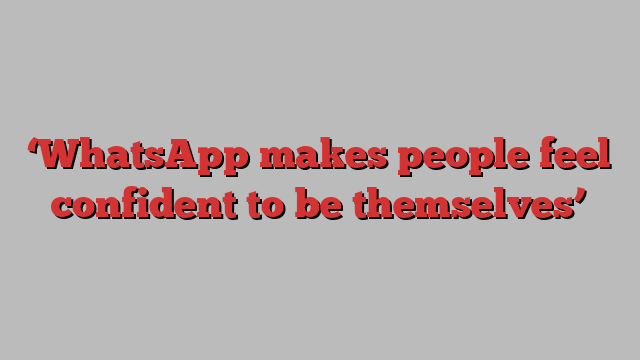
Alice Newton-Rex is director of product at WhatsApp, one of the world’s most popular messaging platforms, with more than 2bn global users.
She joined WhatsApp, which is owned by Meta and sister to Facebook and Instagram, in 2019, leaving her role as chief product officer at London-based money transfer firm WorldRemit. Before that, she was a product manager for the UK government’s digital service and helped set up the gov.uk website.
WhatsApp has recently thrown itself into a worldwide debate over privacy, specifically over so-called end-to-end encryption, which protects communications so that only the sender and the recipient of messages can read them. Critics claim this allows bad actors, such as terrorists or child abusers, to avoid detection by law enforcement.
The communications platform has been battling lawmakers in the EU, the UK and India, arguing that any measures to weaken such technology would infringe on users’ privacy and threaten democracy by providing governments with access to private messages.
WhatsApp has also recently introduced artificial intelligence, enabling users in some regions to interact with a text chatbot and use image generation features.
Cristina Criddle: I thought we’d just start on privacy and end-to-end encryption and why that’s so important for WhatsApp.
Alice Newton-Rex: We think that end-to-end encryption is one of the best technologies for keeping people safe online. It makes people feel confident to be themselves, just like they would in a real-life conversation. The app became encrypted in 2016 and we brought what was quite a new technology to a global audience to protect the conversations of what’s now more than 2bn people.
CC: Why did WhatsApp take that approach — and why are the other Meta platforms following suit now?
ANR: [Meta chief executive] Mark Zuckerberg has always championed encryption. He was instrumental in WhatsApp’s decision to do it in 2016. And people want their conversations to be private, both from any hackers or criminals who might try to access them, and from anyone else. That’s why Meta’s other apps are following [suit].
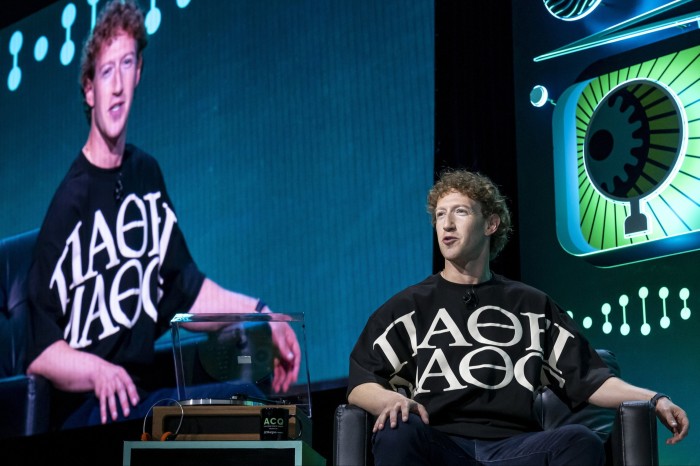
CC: So it wasn’t anything to do with the Cambridge Analytica scandal and wanting to have a new face of respecting people’s privacy? [In the mid-2010s, British consulting firm Cambridge Analytica gathered data from millions of Facebook account holders, without their consent, to use for political advertising — prompting a public outcry against both businesses.]
ANR: Privacy has always been at the core of WhatsApp. We have tons of other features that ensure people’s privacy, like disappearing messages, which we launched a few years ago. There’s also chat lock, which enables you to hide any particular conversation behind a PIN so it doesn’t appear in your main chat list.
CC: Can you explain how end-to-end encryption works? How do you put it on a platform?
ANR: End-to-end encryption essentially means that the only people who can read a message are the sender and the recipient. No one else. Not WhatsApp or Meta, not governments who might want to gain access to those messages, and not hackers or criminals.
CC: Is there a high demand? And has that changed in your time at Meta?
Tech Exchange
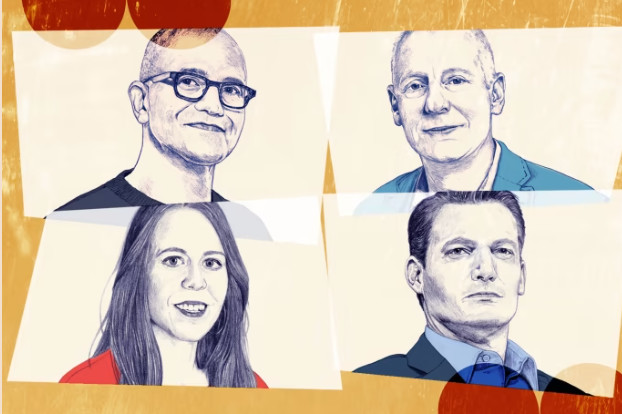
The FT’s top reporters and commentators hold conversations with the world’s most thought-provoking technology leaders, innovators and academics, to discuss the future of the digital world and the role of Big Tech companies in shaping it. The dialogues are in-depth and detailed, focusing on the way technology groups, consumers and authorities will interact to solve global problems and provide new services. Read them all here
ANR: Users definitely want it. Now, do I think the average user understands how end-to-end encryption works? Probably not. But they do know it’s a technology that can make their conversations secure, and they’re really excited about having it.
CC: There is a lot of debate around whether you can ever have client-side scanning [where messages are monitored for criminal content], or any way to access the content of messages without breaking encryption. Do you believe there is a way to do that?
ANR: We think that it’s compatible to have encryption and to safeguard people’s safety on the app. So, while keeping the contents of messages secure through end-to-end encryption, we work to prevent abuse on WhatsApp. There are three main ways that we do this.
The first is to design the product up front to prevent abuse, by limiting your ability to discover new people on WhatsApp and limiting the possibility of going viral. Second, we use the signals we have to detect abuse and ban bad accounts — scammers, spammers or fake ones. And last, we work with third parties, like law enforcement or fact-checkers, on misinformation to make sure that the app is healthy.
CC: How do you find the misinformation?
ANR: Anyone can report a message. Often, people report misinformation, and then we can see if it was generated from a fake account. We ban accounts that are deliberately spreading misinformation.
Also, we have designed the product to try and reduce the spread of misinformation. For example, we put in place limits, so you can’t forward a message to more than five chats at a time. Similarly, if a message has already been forwarded a lot, you can forward it only to one further chat.
Another example is our partnership with Google, so you can search the contents of highly forwarded messages to understand more about them and whether they’re likely to be true or false.
CC: How do you search the contents?
ANR: A user would select to upload that message to Google. So, it’s a very intentional action to try and get back results and learn more about the message.
CC: Unless a user is reporting something or actively doing that, is there no way for Meta to know what a message’s content is?
ANR: We can’t see inside messages, but reporting is effective, in combination with other signals. For example, if we see an account that suddenly starts sending out millions of messages per minute, that’s a good signal that it’s probably an automated abusive account and we would take it down from the platform.
CC: In the UK’s Online Safety Act, which became law last year, there is a clause to the effect that, if an encryption-breaking technology is developed, regulators can seek to use it. Are you exploring that eventuality?
ANR: We have said that, if we are forced under the Online Safety Act to break encryption, we wouldn’t be willing to do it — and that continues to be our position.
CC: I wanted to ask you about Pavel Durov, the Telegram founder, who was arrested in France over the summer and charged with allegedly facilitating criminal activity on the platform. Telegram doesn’t have encryption by default but is used as a messaging platform in a similar way to WhatsApp. Is WhatsApp concerned about any potential action against it by French authorities?
ANR: WhatsApp and Telegram are very different. Telegram does not have an end-to-end encryption. By default, they store a copy of your messages.
However, if this is an attack on encryption, then we’re very concerned, because our top priority is to ensure the privacy and security of people’s messages. Governments, especially democracies, should also want the very best privacy and security for their citizens, so they should not be trying to get companies to break encryption. Of course, we are committed to complying with all applicable laws and also working with law enforcement on issues like child safety and others.
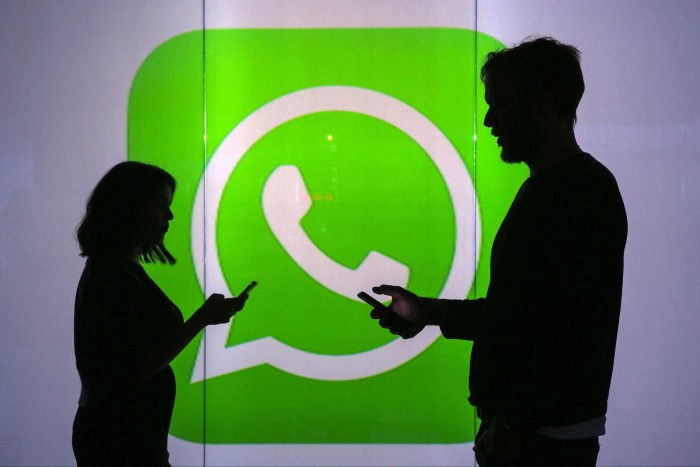
CC: One more question on encryption. As a company, what responsibility do you have over people mobilising — for example, to protest, or connecting up for nefarious activities?
ANR: Well, we comply with applicable laws. We make a huge effort to keep people safe according to the three-point strategy that I outlined earlier. We take our responsibilities seriously, and we think we can do that while making sure that people’s messages remain private.
CC: Are the UK and Europe your biggest markets?
ANR: WhatsApp is very popular globally.
CC: Does it have a most popular market?
ANR: It’s hard to call, because it is so popular globally. I was in Brazil at the end of last year, and they are some of the top power-users of WhatsApp, I would say. They use all of our features the most. A lot of people there said the same phrase to me: “WhatsApp é a vida”, or, translated: “WhatsApp is life.”
CC: Why do you think certain parts of the world, such as Brazil and India, have the trust to use the platform for business-to-consumer relationships?
ANR: We always focus on three core principles, which are simplicity, reliability and privacy. And that’s been the winning combination for people. WhatsApp started off as a place where people were talking to friends and family, but then they got used to how the app works and that was the simplest way for them to connect with businesses as well.
I’ve met businesses who run their entire operations on WhatsApp. They find it’s as easy as talking to their friends and family so have no need to turn to other technologies.
CC: Do you have a sense of why it’s taken off more in some regions than others?
ANR: Some of it is probably down to timing — some businesses didn’t have an existing online presence before WhatsApp became popular. So, then it felt natural to move to WhatsApp.
We are also seeing good use of WhatsApp by businesses in the US and the UK. I bought this ring online and got the delivery notifications through WhatsApp. I had to do an exchange and was able to do that whole thing through WhatsApp as well. I was based in the US, talking to a UK business.
CC: Is that your primary way of generating revenue on WhatsApp?
ANR: WhatsApp has two main revenue streams. One of them is paid messaging, such as the customer service I was just talking about, or maybe an airline sending you a boarding pass.
The other is Click to WhatsApp ads, which are run on Facebook and Instagram. When you click on them, it opens up a conversation with the business on WhatsApp. This is popular in some developing countries, where businesses might not have a presence online.
CC: Which does better of the two?
ANR: Click to WhatsApp ads is the more established business, with revenue in the billions. Paid messaging is a bit earlier in the journey, but it’s also doing well and we’ve passed a $1bn run rate.
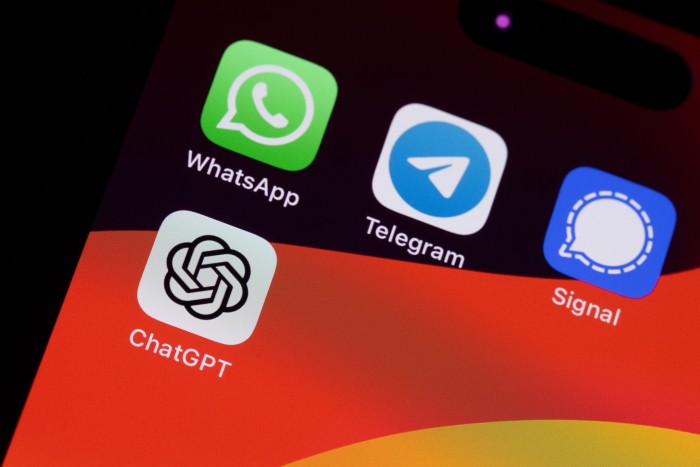
CC: What’s the vision for Meta AI and the metaverse? How are we going to see that on WhatsApp?
ANR: I’m really excited about the potential for Meta AI on WhatsApp. It’s already live in some countries. You can talk to Meta AI as an assistant within your WhatsApp and ask it questions — maybe ask it to settle a debate that you’re having with friends on WhatsApp. Now, you can generate realistic images of yourself in any scenario you describe, for example climbing Mount Everest.
WhatsApp has the potential to democratise access to AI by bringing it to a global audience, not just tech elites and early adopters. Meta AI on WhatsApp is popular in the US as well as in India, Mexico and Colombia.
CC: I’ve only just got it, because we didn’t have it in the UK.
ANR: Do you like it?
CC: I find it a little disruptive, actually, when I’m trying to search for something in my messages, because I keep getting suggestions from the AI rather than the content I’m looking for. But I’m delighted by some of the image features and text-bot features.
ANR: You should try sticker generation as well. That’s great.
CC: I will do that. When are we going to see it coming to the UK and Europe?
ANR: That is something that we’re working on. Obviously, the regulatory environment in Europe is more complex for things like AI, which is why it takes longer.
CC: How do you design a product when regional regulations vary so much?
ANR: It’s quite common for us to have a launch strategy that starts in some countries before others. But we would love everyone to be able to access these AI features. It’s something that we’re working on.
CC: And the metaverse?
ANR: There are a couple of ways into that. The Meta Ray-Ban glasses enable you to send a photo or a video to somebody on WhatsApp and even have a video call. Also, you can use Meta within the Quest headsets, a nice tie-in between WhatsApp and the metaverse. Hopefully, there’ll be a lot more to come.
CC: With your job, there’s always a balance between adding more features and simplicity. How do you get that right?
ANR: It’s one of the central challenges. The main way that we decide what features to add are by listening to users about what they’re trying to do with the existing product, and then making that easier.
Business would be a good example. Long before we had official business tools, businesses were trying to engage with their customers on WhatsApp. And we thought: we can make that better by introducing our business platform, which, for example, lets businesses have a catalogue so they can show off their products to their customers.
Another example would be channels. Users were telling us they wanted to keep up with the people, topics and organisations they cared about alongside their private messaging. So, we were excited to develop Channels as a one-to-many broadcast feature within WhatsApp. To make sure it didn’t complicate the central inbox, we put it in a separate optional tab, called Updates.
So, if you just want to have the straightforward experience of talking to your friends and family in a private way, you should always be able to do that even though we want to be able to bring additional features. But we’ll make sure they don’t clutter that core experience.
CC: Is there a risk of duplication with platforms like Instagram, where you have Status and Stories and Channels as well?
ANR: We’re just focused on what users want from WhatsApp and making sure that we can meet those needs. It’s great if they can also do some of that stuff on other platforms. We’re always going to try and make WhatsApp the best it can be.
CC: So, it’s seen as very much a separate platform?
ANR: Yes. WhatsApp is absolutely its own platform. We’ve had our Status feature for a long time. It’s actually the world’s most used stories product. On a recent trip to Mexico, I was talking to people about how they use WhatsApp Status versus Instagram Stories. They felt that WhatsApp Status was a really nice, low-key way to give updates about their life and maybe Instagram was where they were trying to present their best life.
CC: So, more people post statuses on WhatsApp than stories on Instagram? Is that right?
ANR: I don’t think I could go into details as specific as that, but it’s certainly a very big product.
CC: I’m interested in how you’re planning to make money from these features. So, on Channels, is there a vision to monetise that?
ANR: We definitely see an opportunity to help admins build a business around their channel, for example, by making it paid, or maybe giving them a chance to promote themselves in the directory.
CC: Could it be like an OnlyFans-style model?
ANR: A better analogy would be signing up to an email subscription newsletter.
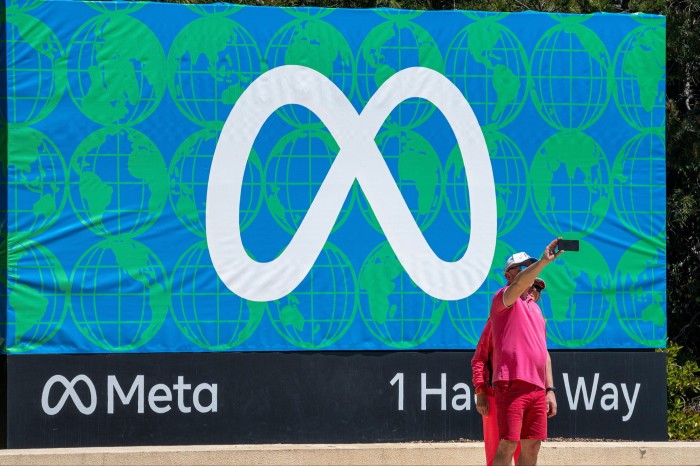
CC: Universal Music recently struck a new multiyear licensing deal with Meta Platforms to include sharing music across WhatsApp for the first time. How are you looking at using music on WhatsApp?
ANR: A lot of users ask for music within their Status posts, so that’s definitely something we’re looking at.
CC: And nothing else beyond that?
ANR: No firm plans at the moment.
CC: Great. I’m really interested to note also how you’re building your business in the US and how you’ve gained popularity there.
ANR: We announced recently that we have hit 100mn monthly active users in the US, which is a really exciting milestone.
In the US, a lot of people face the problem of having a group chat on iPhone — then a friend joins from Android and it feels like the whole chat breaks. The messages are no longer being sent in an encrypted way and you can’t have things like reactions or high-resolution media. WhatsApp however works across devices and you don’t have to deal with the blue-green message bubble drama.
So, we’re seeing great traction across the US, but particularly in big cities like LA, Miami, and cities across the south. We have just reached 10mn monthly actives in Texas, for example. But there’s a lot more that we can do here and I’m excited to see it continue growing.
CC: Why do you think the US has been a difficult market?
ANR: The iPhone is more prevalent here. So, for a lot of people, iMessage has been the default option. Until recently, many didn’t realise there was a better way that was going to work across platforms and give them the things that people love from WhatsApp, like voice notes.
CC: The blue-green interaction is interesting, with younger users especially disliking green [Android] messages. Why do you think that has become such a divisive issue?
ANR: People have this feeling that one person coming in who turns the messages green has broken the whole conversation because you lose access to some functions. It’s really awkward if somebody reacts to a message and, instead of coming through as an emoji, you see: “X liked this message”. It suddenly feels clunky and heavy. So, it has ended up being pretty divisive — especially among groups like teens. That’s really disappointing and we think we can do better.
CC: How important are interactions like that in bringing on new users?
ANR: Group chats has always been one of the things that is most attractive to people on WhatsApp. I have tons of family and friend groups that have been around for many, many years. It’s the core of where many groups get to interact and connect with each other.
CC: How are you preparing for the upcoming US election?
ANR: This has been a year of many elections around the world. We are continuing to build out our playbook for reducing the spread of misinformation. In many places, we’ve run campaigns to warn people about the risks of misinformation and to make sure that there are authoritative sources of content on the platform — like partnering with third-party fact-checkers. So, you can forward your WhatsApp message to a fact-checker and get a response.

CC: How effective have those tools been? Are people using them?
ANR: Yes. We see people using them. We’ve also seen fact-checkers, for example, with popular WhatsApp channels — another way to get authoritative information into the system.
I mentioned our Google partnership earlier, which we’ve continued to work on, to help people look up the contents of messages where they may suspect they’ve been sent misinformation.
CC: Have you had to bulk up resourcing because of the number of elections this year?
ANR: We have focused on [2024] as the election year. We have a substantial team working on integrity, which includes misinformation. But, of course, we’ve been paying a lot of attention to when elections are taking place, especially in markets where WhatsApp is really big.
CC: What’s the most exciting thing we can expect from WhatsApp in the next few months?
ANR: I think all the generative AI tools are really exciting. One core experience that we’re working on is Filters and Favorites.
Users say they have a sense of information overload when they open the app, so we’re working to elevate the conversations that matter to you. You can list people as “favourite”, then, either in your calls or message list, you’ll be able to filter for those messages.
CC: And where does the inspiration come from?
ANR: We’re very grounded in our own experience of using WhatsApp. If we face a problem, we can assume our users will too. So we rely heavily on our product intuition. Plus I mentioned trips to Brazil and Mexico. Next week, I’m going to India. Understanding how people use WhatsApp is a good source of inspiration.
CC: Do you get lots of people moaning at you?
ANR: Sometimes. But, more often, people come up with bright ideas of what they’d like to see next on WhatsApp.
CC: That’s great. Thank you so much.
ANR: Awesome.